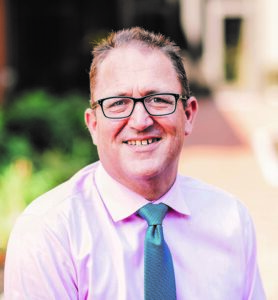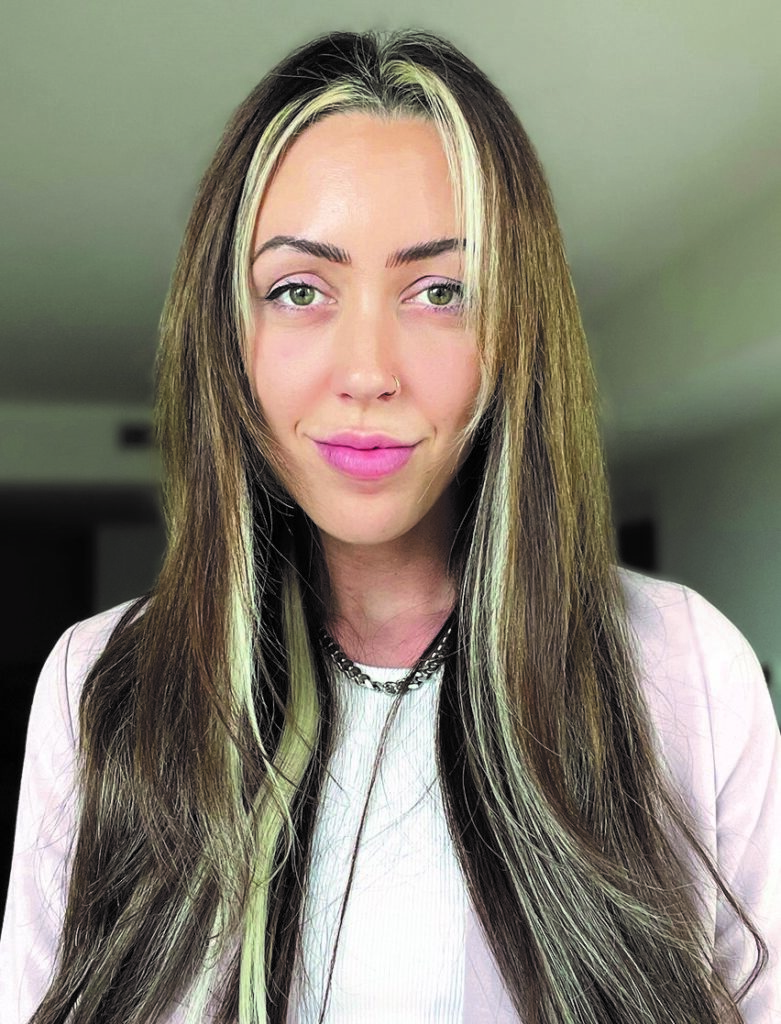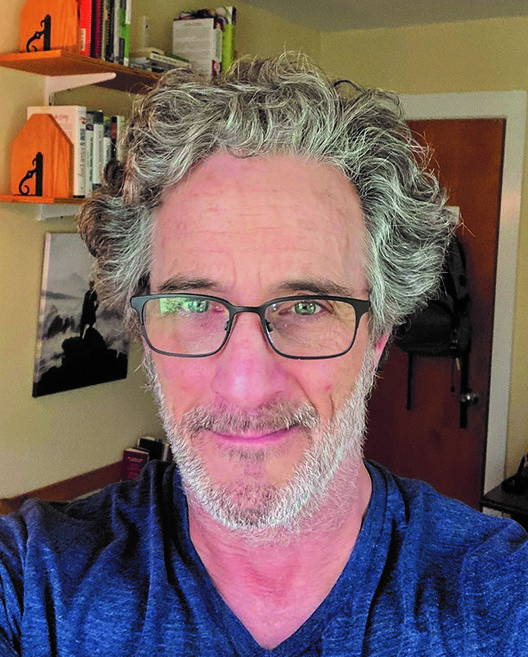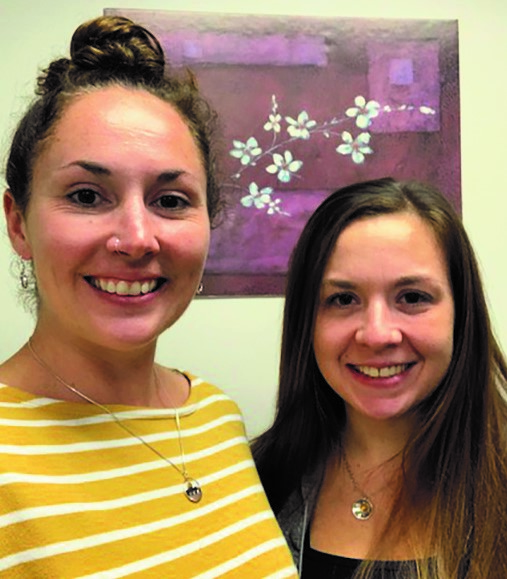Across the country, Antioch alums are finding and creating different roles to accomplish the common goal of helping people in their moments of need.
The greatest opportunities to help people escape from the loop of addiction often come in moments of crisis. That’s why when Nelson Pell Hayden ’18 (Antioch New England, MA in Clinical Mental Health Counseling) gets a call that someone has ended up hospitalized for a reason related to substance abuse, he rallies the team at his clinic, The Doorway, to “get up out of our desks and get in our cars and drive over to the hospital, which is about three miles away, and meet people in the hospital.”

Meeting these patients and making that connection in their moment of real suffering and gravitas makes all the difference for many people suffering from addiction, helping them to get over the important step of actually begin coming to his organization’s office in downtown Keene, New Hampshire. By making a point of building relationships with both ER doctors and with patients in crisis, Hayden has been able to change the patterns in his community, steering more people into treatment and helping them stay in it.
But Hayden isn’t alone in his quest to make addiction treatment more accessible, less stigmatized, and ultimately more successful. Hundreds of Antiochians across the country are engaged in this work. They are applying the expertise that they developed while studying addiction counseling and treatment at Antioch to make necessary change and save lives out in the wider world. These devoted alumni are working in a multitude of roles, and often are innovating in powerful ways. This fall, I caught up with five of them on Zoom.
Finding Innovative Solutions to Reach Those in Need
Hayden’s path to working in addiction treatment wasn’t a straight line. In fact, this is his third career. First he worked in hospitality, eventually rising to manage entire hotels. Then he switched careers and began managing medical practices. He explains, “I thought medical practices needed a bit more of the hospitality that I had learned in the hospitality industry.” Eventually, he decided to return to school at Antioch New England and retrain as a Clinical Mental Health Counselor.
This varied background serves him well now that he’s director of The Doorway, as he’s able to bring his business skills to bear in managing his staff (3 full-time clinicians, 2 recovery coaches, 1 prescribing doctor, 1 RN, 1 receptionist) and ensuring that their clients are well-served. But when Hayden was in the program as an adult learner, he worried at one point that he might not graduate. It was during his final internship, when his paperwork at the residential treatment center he was supposed to be working at was slow to come through. “I was a third of the way through my proseminar class,” he explains, “and I still hadn’t completed a single internship hour” out of the 300 he still needed to get his license.
His instructors in the course saw his anxiety and worked to allay it by keeping him focused on the work at hand, and not to worry, explains Hayden. “Their thinking was, ‘Okay, we’ve just got to keep him engaged… Just keep him engaged. He’ll be all right.’” And he was: his paperwork cleared, and he finished the degree and the certification. But this experience—and the general welcome with which he was received despite being older than a lot of the other students—stuck with him. Today, says Hayden, “That’s what I try to do. I mean, people come into my office in all shapes and sizes, disposition, socio-economic.” He focuses on the work ahead and what can be done right now. As he tells clients, “The reason you came here is because you have a substance use disorder. And so, let’s focus on that, then we can individualize everything else.”
Promoting Sober Living to Outpatients … and on TikTok
Another alum doing good and innovative work is Gracie Walker ’19 (Antioch Los Angeles, MA in Clinical Psychology) who today serves as the Teen Program Director at Clear Recovery Center, a rehab and outpatient service provider based in Redondo Beach, California. Walker also sees clients in private practice, and she maintains a TikTok account (@disgraciex) with 200,000 subscribers that she uses to promote mental health awareness and the joys of sober living. In short, she is an influencer online but also in her extensive work supervising other therapists and directly impacting patients.
But it wasn’t at all obvious when she first came to California that she would become such a powerful force for healing. In her early twenties, she was herself in the grip of addiction. Her parents sent her from her native Kentucky out to Malibu, to an inpatient rehab. She struggled at first, repeatedly running away, relapsing, and struggling to get and stay sober. Then she formed a transformative relationship with a therapist.
This therapist, Donovan, was initially her group facilitator, but he sort of appointed himself as her therapist. He was sometimes strict, like when he told her parents to stop supporting her, or when he fired her as his patient, telling her “you can come back when you have something of substance talk about.” In retrospect, Walker describes these as “baller therapist moves.” In a pivotal session, he told her that she was never going to stay sober if she didn’t get direction in her life. “He knew,” says Walker, “that if I just like sat around and got a job at a coffee shop, I was going to get high.” So mid-session he told her, “You’re either going to go to school and become a therapist, or you’re going to become a lawyer. Pick one right now, in this moment.” She chose to become a therapist.

She graduated in 2019 from the first cohort of the specialization in Addiction & Recovery in Antioch Los Angeles’s MAP program. And upon graduating she immediately went to take a full-time job at her traineeship site: Clear Recovery Center. She’s worked there ever since in a variety of roles. Today, Clear Recovery Center is expanding, opening new offices across the South Bay, and aiming to expand regionally. And Clear’s leaders have elevated Walker to be one of four directors in the organization. Now that she’s in a position to hire trainees, case managers, and therapists, she’s helped bring on her own therapist Donovan, to work at Clear. And she’s also had the chance to hire many Antioch-trained therapists, who she says stick out for being forward-thinking, good with adolescents, and client-centered.
When she’s not working at Clear, Walker can often be found making another video for TikTok, where these videos often rack up tens of thousands of ‘likes’. She is part of a world of therapist creators on the platform, and she finds it to be a great way to share valuable information and build rapport with young people today. “Clients like to feel safe and connected to their therapists,” she says, and it helps that “I’m covered in tattoos, and I have TikTok.” It’s sometimes scary to put so much of her life and self out on the internet, but she’s learned that sometimes you need to do something new as a therapist. “I think Antioch is probably why I was even willing to risk putting myself out there, because it was so open and forward-thinking,” says Walker. “I wasn’t presented with a one-dimensional concept of what a therapist is.”
From Hollywood to Treating Addiction in Vermont

Not everybody I spoke with found their calling in addiction treatment by moving west. Take, for instance, Alan Gelfant ’06, ’21 (Antioch Los Angeles, BA; Antioch New England, MA in Clinical Mental Health Counseling), a former actor who found a second career as a therapist when he moved back to New England. Gelfant himself got sober at age 26, while he was a stage actor in New York. Later he moved to Hollywood where he found steady work in front of the camera, with the occasional starring role (Next Stop Wonderland) and some recurring TV roles, too (To Have & to Hold). Throughout his career as an actor, at least after he got sober, Gelfant always made a point of volunteering at hospitals or rehabs where he could work with alcoholics and addicts on a non-professional, community level.
While living in LA, Gelfant attended the degree completion program at Antioch Los Angeles and finished the last year of his BA. As he explains, “I was just so bored with, you know, just thinking and talking about careers and acting, that I thought it’d be interesting to go back to school.” He ended up loving his “amazing” teachers there.
So it made sense to seek out Antioch again a decade later, when he was living back in New Hampshire, caring for his mother, and thinking about starting a new career as a therapist. He wanted to expand on the work he had done reading dramatic monologues in addiction treatment centers. Today he’s a licensed drug and alcohol counselor in the State of Vermont, though his practice includes work also with people suffering from PTSD and domestic violence offenders and victims. In contrast with when he would go volunteer in rehabs in New York and Los Angeles, he now mostly works in the more formal setting of one-on-one therapy, though he has also worked in a wide variety of inpatient and outpatient settings.
Today he’s a licensed drug and alcohol counselor in the State of Vermont, though his practice includes work also with people suffering from PTSD and domestic violence offenders and victims. In contrast with when he would go volunteer in rehabs in New York and Los Angeles, he now mostly works in the more formal setting of one-on-one therapy, though he has also worked in a wide variety of inpatient and outpatient settings.
Today, Gelfant is still quite involved in community theater in Vermont. And there are, of course, some areas where his former and his current professions overlap. “At its sort of finest and most aggrandized, acting, theatre, writing—much of the arts—is an exploration of the human condition,” he explains, “so I do find therapy to be in line with that, as far as that same level of interest.”
Diverting Drug Offenders From Prison to Treatment
Back in Keene—the location of Antioch New England’s campus—two graduates are working within the criminal legal system to help divert those who have abused drugs away from incarceration and into treatment. Called the Cheshire County Drug Court, this program’s clinical director is Stacey Lanza Roberts ’14 (Antioch New England, MA in Clinical Mental Health Counseling; pictured, right). Lanza Roberts is responsible for more of the administrative side of things, while the program’s clinician is Marty Barnard ’17 (Antioch New England, MA in Clinical Mental Health Counseling; pictured, left). Together, Lanza Roberts and Barnard serve as the program Treatment Providers, providing a broad range of services, including group therapy meetings, one-on-one therapy, and case work.

For Barnard, working in a healing field was a deliberate choice. “I knew that I wanted to be in a helping profession in some way,” she says, “and I didn’t know what that would look like at first.” Before starting at Antioch she had spent many years employed as a bartender, so in some ways it made sense when after a year-and-a-half in the program she decided to specialize in treating substance abuse disorders. “I felt drawn to it. And it really changed my mind,” she says. “There’s such a need in this field.” Barnard ended up doing her internship at the Cheshire County House of Corrections, where her supervisor saw her talents and recruited her into working at Cheshire Drug Court.
This happened to be the exact same pattern that brought Lanza Roberts to work there, too. Lanza Roberts had enrolled at Antioch directly after finishing college, largely because of its convenient geographic location (she grew up in central Vermont) and its reputation as “hippy dippy.” As she explains, “I liked that none of my grades mattered—even though, as soon as I got to Antioch, I converted all of the grades into letter grades, to reassure myself that I was good. Because I’m that kind of person.” Even more important was the loving, peaceful, and supportive community that Lanza Roberts found there. When it was time for an internship, the only place that she found to work was a residential treatment center called Phoenix House. She ended up loving the work there so much that she got on the substance abuse treatment track at Antioch, and she too did her second internship at the jail, where she was recruited to work for drug court shortly after graduating.
Today, these two thoughtful graduates are enthusiastic about their work. In their rapport and mutual enthusiasm, it’s clear how much they enjoy working together to help those members of their community who are most suffering from substance abuse disorders. But drug court is also a hard job to work, with both long hours and a sometimes difficult clientele. Already, at four-and-a-half years, Barnard is the longest-tenured clinician in the history of Cheshire County Drug Court.
Sometimes, Lanza Roberts and Barnard dream about going into private practice. “We’ve dreamed about doing it together,” says Barnard.
Lanza Roberts jumps in to say, “And someone’s going to have to figure out how to bill insurance, because we don’t know how to do that.” But they do know just about everyone in Keene, she says. “We could probably build the client population pretty quick is my guess.”
“Yes, we can,” says Barnard. “We both love working with the population we work with. So we’ll probably try to stay somewhat in that realm. If we can. Let’s see.”
To read a related story about an Antioch Los Angeles grad raising awareness of trans issues among therapists, visit news.antioch.edu/trans-leader



